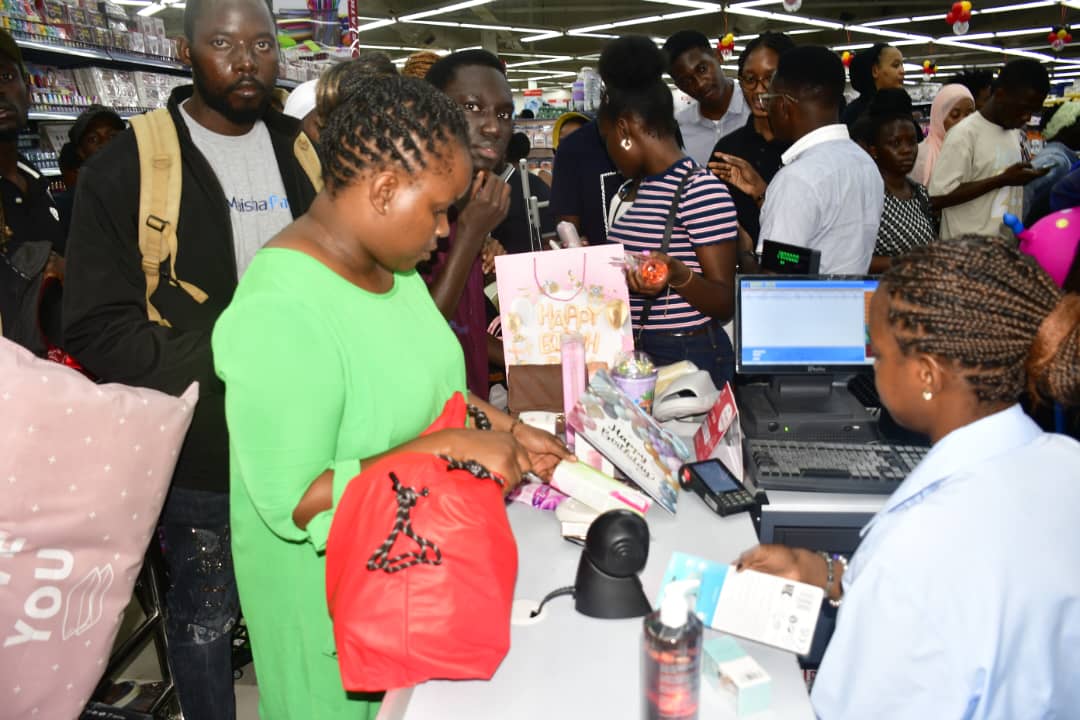China Town store steals the show with cheap products

Some of the customers lineup to enter China Town store located in Lugogo on September 2, 2024. PHOT/STEPHEN OTAGE
What you need to know:
Police were forced yesterday to close the newly-opened China Town Su-per Stores, a new Chinese Store after several Ugandans visited the place to buy themselves cheap merchandise.
Mr Daniel Akwanget, the head of marketing at the store, said many of the clients who are thronging their stores are TikTok influencers.
Police were forced yesterday to close the newly opened China Town Super Stores, a new Chinese Store after several Ugandans visited the place to buy themselves cheap merchandise.
The new store, which opened at the former Shoprite Supermarket in Lugogo at the weekend, mainly deals in home appliances that include Chinese electronics, fabrics, Kitchenware, sports equipment, furniture, television sets, and crockery, among other items.
Surprisingly, the items are being sold at giveaway prices, which are far less than the actual price downtown.
The attractive prices had several shoppers queuing up since morning yesterday.
Mr Daniel Akwanget, the head of marketing at the store, said all clients who are thronging their stores are TikTok influencers who have been posting their videos on their TikTok accounts, drawing huge crowds.
“We didn’t know that the social media influencers were advertising for us indirectly. We have been seeing people coming to the stores, they take videos of our products and share them. This is why we have all these crowds. We didn’t pay or even hire the influencers. These people are coming here on their own,” he said.
When our reporter visited Lugogo yesterday, he found two long queues of Ugandans of all age groups struggling to access the store. Inside the shop were potential customers doing window shopping while others were shopping.
Unlike the typical Ugandan supermarket where the shelves are usually dominated by locally processed and manufactured agricultural products, in Chinatown, the shelves have strictly Chinese electronics, fabrics, kitchenware, sports equipment, furniture, and television sets, among other items.
Mr Meddie Ahmed Matovu, an importer of decorative lights and chandeliers, said some of the lights sold at the store cost as low as Shs145,000 compared to the downtown prices of Shs300,000.
“A compressor that cost Shs5m in town had a price tag of Shs2.9m,’’ he said, adding that the new store had created an unfair competition for Ugandan traders.

Shoppers at China Town Super Store
When asked why Ugandan and other products from the East African Community member states are not on their list of cheap products, Mr. Akwanget said some manufacturers have taken their products to the store but their system, which is directly linked to Uganda Revenue Authority’s Electronic Fiscal Receipting and Invoicing Solutions (EFRIS), rejected them because they do not have EFRIS tags.
Ms Gloria Peace Namiiro, one of the shoppers, said she saw a post on TikTok, and she went to confirm the low prices.
Mr Brian Masokoyi, a plumber who went shopping with his wife, said the cost of the plumbing materials that he bought from the store and the hairdressing materials his wife purchased, would have cost them over Shs400, 000. Instead, they parted with Shs200,000 for the same products.
Ms Irene Namugga, a nurse working at Nsambya Hospital, bought a multipurpose two-liter Hoffan Blender, which she said is the best and most durable in the market at Shs65,000 compared to Shs360,000 in the open market. She said the blenders can also grind coffee.
KACITA’S RESPONSE
Asked to comment about the cheap Chinese products in the market and unfair competition, Mr Issa Ssekito, the spokesperson of Kampala City Traders’ Association (Kacita), said he wasn’t aware of it, and neither was Dr Ezra Rubanda, the executive director for Uganda Manufacturers’ Association.




